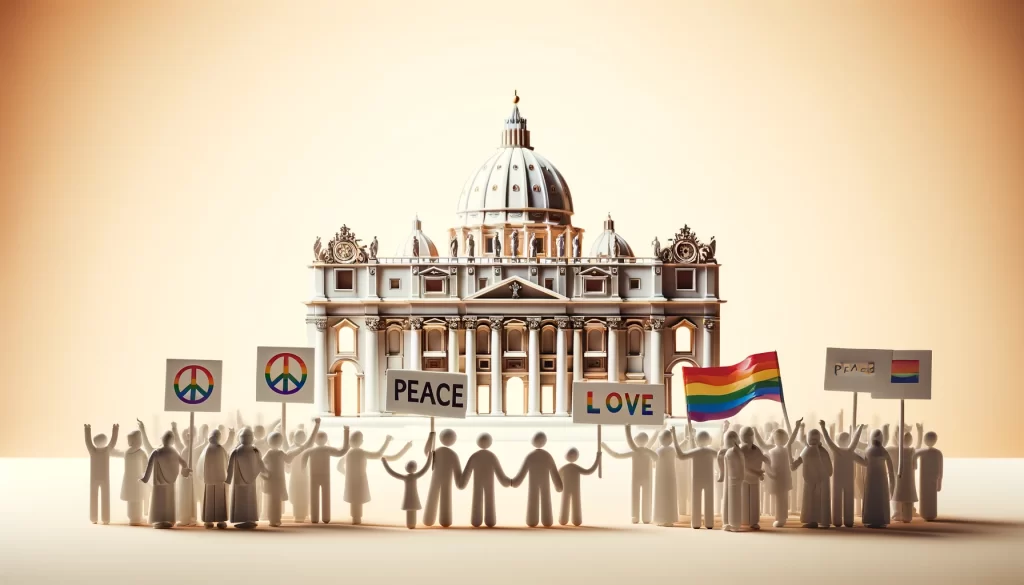On Monday, the Vatican unveiled a document, approved by Pope Francis himself, that touches on such topics as gender identity, transition surgeries, and surrogacy.
According to the document, the sex a person is born with is considered an unchangeable gift from God. It states, “any sex-change intervention, as a rule, risks threatening the unique dignity the person has received from the moment of conception.” It also reflects a belief that striving for self-determination in one’s gender identity might be akin to trying to “make oneself God.”
Surrogacy, where a woman carries and gives birth to a child for another person or couple, is another subject the Vatican addresses unequivocally. The church expresses its opposition to this practice, regardless of whether the woman involved chooses to do so freely or under coercion. The document explains that this approach to childbirth turns the child into “a mere means subservient to the arbitrary gain or desire of others.”
The Vatican’s declaration is part of a broader discussion on human dignity, which also considers the exploitation of vulnerable groups including the poor, migrants, and women. This broad scope underlines the church’s commitment to addressing issues of injustice and dignity across various spheres of society. Notably, this document was released following Pope Francis’ gestures of inclusivity towards the LGBTQ community within the church, such as allowing blessings for LGBTQ Catholics and the baptism and participation of transgender individuals in church ceremonies.
The consolidation of the church’s teachings on gender and surrogacy is likely to be welcomed by conservative members for its stance against what they might view as liberal ideologies. However, it also poses challenges for LGBTQ advocates within the church, who fear it may be used to further marginalize transgender individuals, despite its caution against “unjust discrimination.”

Critics, like Francis DeBernardo of New Ways Ministry, argue that the document overlooks the complexities of gender identity, focusing too narrowly on physical appearance and not considering psychological, social, and spiritual dimensions. They also note a “stunning lack of awareness” of the lives of transgender and nonbinary individuals and suggest that the document dismisses their experiences too readily.
Despite these controversies, the Vatican’s document attempts to navigate a middle ground, reiterating the church’s core teachings while striving to protect personal dignity. Pope Francis, known for his outreach to gay and transgender Catholics, continues to emphasize a more welcoming church, even as he upholds traditional church doctrines, including those that view homosexual acts as “intrinsically disordered.”
The document also addresses concerns about “ideological colonization” – the imposition of specific views on gender and surrogacy by wealthier nations on those with differing beliefs. It acknowledges the ongoing debate over the scientific coherence of gender theory and calls for respect and understanding across differing viewpoints.
Cardinal Víctor Manuel Fernández, in introducing the document, highlights its doctrinal significance and the church’s intention to provide clarity on these complex issues. The document, titled “Declaration Dignitas Infinita, on human dignity,” aims to contribute to the broader conversation on human dignity amid the challenges and changes of our time.
This article is based on the following article:

Background Information
Understanding these background elements can help readers navigate the complexities of the Vatican’s document, the societal and ethical questions it addresses, and the broader conversation about how religious institutions engage with contemporary issues of gender, identity, and human rights.
Roman Catholic Church’s Structure and Authority
- The Vatican: The central governing body of the Roman Catholic Church, located in Vatican City. It is led by the Pope and includes various departments that manage church affairs.
- Pope Francis: As of the time of the article, the head of the Roman Catholic Church. Known for his more progressive stances on certain issues, he has sought to make the church more inclusive.
- Church Doctrine: The official teachings of the church, which include moral and theological principles believed to be inspired by God. Changes to doctrine are rare and considered significant.
Gender Theory
- Definition: Gender theory explores the idea that gender is not solely determined by biological sex but can be influenced by cultural, social, and individual factors.
- Gender Fluidity: This concept suggests that gender exists on a spectrum and can change over time for some individuals, challenging the traditional binary view of gender as strictly male or female.
- Transition Surgery: Medical procedures that some transgender individuals may undergo to align their physical appearance with their gender identity.
Surrogacy
- Definition: Surrogacy is an arrangement where a woman carries and delivers a child for another person or couple.
- Types: It can be commercial (paid) or altruistic (unpaid), and can involve the surrogate’s egg or the egg of another woman.
- Ethical Debates: Surrogacy raises various ethical questions, including the rights of the surrogate, the child, and the intended parents, and concerns about exploitation.
LGBTQ Rights and Religious Teachings
- LGBTQ Community: Includes individuals who identify as lesbian, gay, bisexual, transgender, queer, or questioning, plus other sexual orientations and gender identities.
- Religious Views: Various religions, including Roman Catholicism, have traditionally held conservative views on gender and sexuality, often based on interpretations of religious texts.
- Dialogue and Debate: There has been ongoing debate within and across religious communities about LGBTQ rights, with some advocating for more inclusive practices and others holding to traditional teachings.
The Importance of Human Dignity
- Central to the Vatican’s document is the concept of human dignity, the idea that every person has inherent worth and should be treated with respect and compassion. This principle underlies many of the church’s teachings and is a key point of discussion in debates on gender, sexuality, and bioethical issues like surrogacy.

Debate/Essay Questions
- Does the rejection of gender fluidity and transition surgeries by religious institutions constitute unjust discrimination, or is it protected from criticism because it is a religious doctrine?
- Should the personal choice of surrogacy be respected as a right, or should it be regulated based on ethical or religious grounds?
- Does the concept of ‘ideological colonization’ apply fairly to the promotion of LGBTQ rights and gender theory globally?
Please subscribe to Insight Fortnight, our biweekly newsletter!
